
THE HANDSTAND
MAY 2005
HAMRI AND THE MASTER MUSICIANS OF joujouka,
by frank rynne
In some ways it seems like a
dream but then the people who are dead were real and that
takes 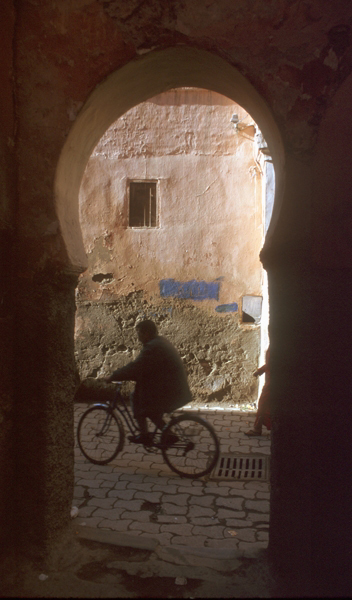 over
the reality. However there are the living and they must
have some voice.
over
the reality. However there are the living and they must
have some voice.
Djinns, Sufi & Western Wishful Thinking
As a musician I have over the years developed a thick enough skin and a wry sense of humour regarding almost all aspects of the musical process. Musicians are not all regular people despite the posturing of Phil Collins and Sting types. They always have something going on, some misfortune, some deal, a good/bad drug/money/love suss, whatever. I have met and worked with all kinds of people through music but the group of people who have brought me the greatest highs and lows are The Master Musicians of Joujouka. They are not a group in the sense of a rock group, they are hill farmers from the Al Sherif Mountains outside Tangier in North Morrocco . The music they play is the traditional music of the region but they have their own special repertoire which has fascinated and enthralled many western visitors to the village. Shepherd boys can still be heard playing on small bamboo flutes in the pastures above Joujouka.
Since getting to know these musicians and their families and living with them in their village I have also become embroiled in a controversy which should be catalogued and used to demonstrate how World Music is both a sham and a control mechanism whereby white people mainly from the UK., France and the USA have worked out a way to exploit and appropriate the traditional songs, music, and musicians of the developing world. The idea of an Uncle Tom is one which in a PC world is uncool to contemplate but as with the English Raj in India the way to control and exploit is lubricated by getting someone from the exploitable side to control his/her people while the foreigner gets on with the serious business of making money.
 In
the early 1950s Mohamed Hamri, an artist and the son of a
Joujouka woman, brought Brion Gysin and Paul Bowles to
his village. The music there struck Gysin as being
profound, and was inspirational to his own artistic
ideas. Gysin was a painter who would later give William
Burroughs the Cut-Up Method to use in writing. Over the
next two decades Hamri and Gysin promoted and helped the
musicians of Joujouka. They set up the 1001 Nights
restaurant in Tangier where the musicians could play and
make a living when things were very bad in the mountains.
Morocco on the cusp and just after independence was a
place fraught with poverty and the peoples of the Rif the
poorest of the poor.
In
the early 1950s Mohamed Hamri, an artist and the son of a
Joujouka woman, brought Brion Gysin and Paul Bowles to
his village. The music there struck Gysin as being
profound, and was inspirational to his own artistic
ideas. Gysin was a painter who would later give William
Burroughs the Cut-Up Method to use in writing. Over the
next two decades Hamri and Gysin promoted and helped the
musicians of Joujouka. They set up the 1001 Nights
restaurant in Tangier where the musicians could play and
make a living when things were very bad in the mountains.
Morocco on the cusp and just after independence was a
place fraught with poverty and the peoples of the Rif the
poorest of the poor.
In 1968 Gysin and Hamri
brought Rolling Stone Brian Jones to Joujouka. He spent a
night there recording and when he got back to London
enthused wildly about their music and set to work
mastering the album. Jones died in 1969 before the album
was released. In 1971 the first release on Rolling Stones
records was Brian Jones presents The Pipes of Pan at
Joujouka. Cut to 1995 Hamri hears that the reissue of
the Brian Jones album is out all over the world. The
cover he  painted for the
original album has been replaced by a photo of Bachir
Attar, a musician from Joujouka who having lived in New
York decides to take over the birthright and business of
his former village. The original sleeve notes by Brion
Gysin were altered to remove Hamri's credits. Top music
writers like Stephen Davis are strongly behind the
project which comes out through Philip Glass's Point
Music label. Peter Gabriel's Real World rallies behind
Bachir despite protests from Hamri. The musicians who
played on the album and their descendants get to see
nothing of the £100,000 paid out by the record
companies. Bachir was 7 when the record was made.
painted for the
original album has been replaced by a photo of Bachir
Attar, a musician from Joujouka who having lived in New
York decides to take over the birthright and business of
his former village. The original sleeve notes by Brion
Gysin were altered to remove Hamri's credits. Top music
writers like Stephen Davis are strongly behind the
project which comes out through Philip Glass's Point
Music label. Peter Gabriel's Real World rallies behind
Bachir despite protests from Hamri. The musicians who
played on the album and their descendants get to see
nothing of the £100,000 paid out by the record
companies. Bachir was 7 when the record was made.
I have produced one CD with Joujouka, recorded on my first visit there in 1994. Ironically it's named after a song in the village Joujouka Black Eyes.
‘Joujouka is good because the Sanctuary is powerful. Joujouka Black Eyes’
The sad voices of the masters always move me. Sentimentality though will not give these musicians and others like them around the globe their just deserts. Real World Festival studios sampling their happy artists makes me wince. In Joujouka potential new Masters are joining the army to get a living while their birthright is grabbed by various World Music impresarios in the West. The power of the melodies and the cross-over cash potential is not lost on business people who have run out of territory to colonise. After the gold, the oil, the uranium, the trade, and the slave trade are grabbed, all that's left to steal is the culture.
I approached Morocco and Joujouka as a musician and a fan. What follows are some of my observations during various visits to Morocco. Since writing Mujehid Mujdoubi and old Hag have died. Mohamed Hamri is extremely ill. The musicians of Joujouka have been usurped yet again by Bachir Attar. This time Genesis P. Orridge and the Royal Festival Hall provided Bachir with a platform to ply his wares.
Extract from Anything You Want (HERE TO GO SHOW Dublin 1992)
The fax said that our musicians were fake, and to proceed with our festival with this Hamri and his fake Sufis was both legally and morally wrong.
What the fuck was going on ?
I had never met Hamri but had talked to him on the phone many times. Hamri was a legend, talked of in London Beat circles like he was a cross between The Tasmanian Devil, Gaugain and Fagin. The smuggler, beau, criminal, saint, force of nature, Sufi magician, storyteller, painter, and authentic 100% Beat Tangier Interzone player. Fake? What the fuck will we do?
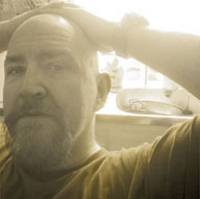 Joe
Ambrose - always solid in a storm - called the shot. Call
this Cherrie Nutting and tell her to fuck off, how can
our musicians be fake, how can Hamri be fake?
Joe
Ambrose - always solid in a storm - called the shot. Call
this Cherrie Nutting and tell her to fuck off, how can
our musicians be fake, how can Hamri be fake?
Joe proceeded to talk to the fax writer Cherrie Nutting and after the first chat was called back by Bachir Attar who he thought sounded quite nice. Bachir wanted to know why Joe called his wife a cunt. Yes he knew Hamri, yes his musicians were ah ...laughter ... Cherrie came back on saying that Joe should talk to Stephen Davis. Stephen Davis, author of Twilight of the Gods, Reggae Bloodlines, wow...Moonwalker even.
Next thing this second fax arrived from Bachir and Cherrie and one from Stephen Davis, where he called Hamri a bludklat, Bludklat. Stephen Davis was willing to hand write a fax just to insult Hamri and try to persuade us not to feature The Master Musicians of Joujouka in our Festival. To us they were the festival. At that point we were stuck with guests like the goofy Sufi Hakim Bey, and New York mythical, cabalistic warrior of the beats/N.Y. scene 1960-present time Ira Cohen. Ira was terrified that Hamri was actually going to be present in Dublin for the festival. His first question on arrival at Dublin Airport was ‘You mean Hamri is actually on his way here now?’ A cloud of horror descended on him. The answer was ‘Yes’.
After a minor problem at Heathrow where two musicians got arrested Hamri and his troupe of just four musicians arrived as the grand opening ended. Joe and myself left the after show party and headed to the hotel where the musicians had been deposited. On our arrival at the Avalon Hotel I could see a strange group of people sitting on a couch. We approached them and Hamri stepped forward. He hugged and kissed us and we all sat down. Hamri readily agreed that they would come back to the party with us. The musicians were dressed in what by western standards were very poor peoples clothes. They hurried downstairs to the lockup and reappeared in five minutes looking resplendent in their brown djellaba decorated with embroidered silk, white razurs (turbans), and Moroccan slippers.
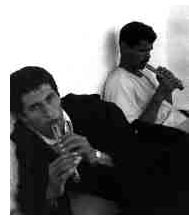 We
got two taxis and headed for South Anne Street where the
after party was being held in a Lebanese restaurant. I
ran in and told Daragh to get the camera running. We
lined up in single file and Hamri lead down the stairs
and into the place. The whole place exploded with cheers
& applause which continued for 5 minutes as the
procession moved through to the back of the restaurant
where a table was cleared. On my way in I noticed Jose
Ferez, Burroughs' UK painting seller.
We
got two taxis and headed for South Anne Street where the
after party was being held in a Lebanese restaurant. I
ran in and told Daragh to get the camera running. We
lined up in single file and Hamri lead down the stairs
and into the place. The whole place exploded with cheers
& applause which continued for 5 minutes as the
procession moved through to the back of the restaurant
where a table was cleared. On my way in I noticed Jose
Ferez, Burroughs' UK painting seller.
(Abdulah Ziat and Mohamed Attar
:photoF.Rynne)
The party continued
until 5 a.m., the musicians playing, Hamri dancing. Six
months of work 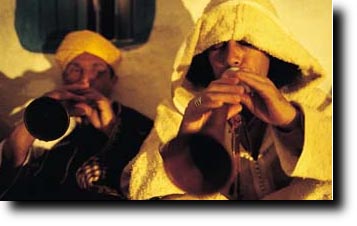 finally
had a high point, everything was worthwhile and for the
first time I heard the music of Joujouka live. This was a
fateful day. The next week Joe and myself did our best
looking after the musicians, that in itself was a full
time job, we also had a show to run.
finally
had a high point, everything was worthwhile and for the
first time I heard the music of Joujouka live. This was a
fateful day. The next week Joe and myself did our best
looking after the musicians, that in itself was a full
time job, we also had a show to run.
Enter Paul Bowles (Tangier Morocco 1994)
‘He be big bastard’
‘Who? Brion ? ‘
‘Yes... but I forgive him, God bless him. Paul Bowles I'll never forgive. He is the biggest bastard in the whole world. You must visit him, you will see.’
This was my third day in
Tangier and my third evening eating dinner cooked by
Hamri, Morocco's greatest living painter, greatest cook
and guardian of the oldest and most cursed music group in
the world - the Masters or Malims of Joujouka
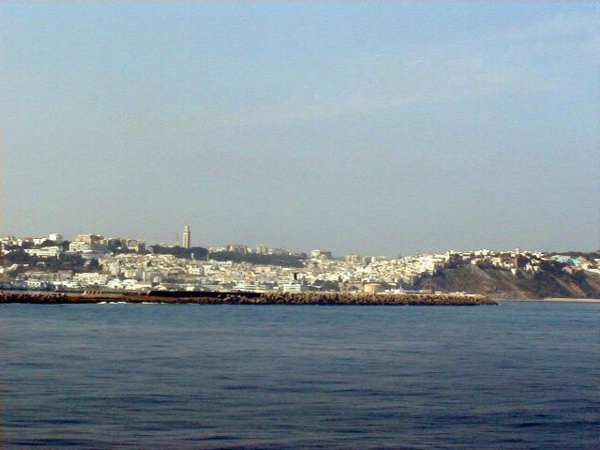
Hamri is relieved that I've arrived in Tangier at last. Every time I called him over the previous 2 years he said I must come and see Joujouka and the situation there for myself.
‘Poor Janey Bowles, ‘ Hamri continues ‘She was a fantastic woman. Paul, he kept me locked up for 3 months when I was fourteen. I was a prisoner. He saw me at the train station in Tangier, then I worked the trains I smuggled from Rabat and Fez, Ksar and everyday I would end up back in Tangier. I never had a ticket, everyone knew me, the police would drink wine, play cards with me, I had a room and a girl. I was the King of the Trains. Paul spied me sitting there painting with my fingers and he came and talked to me. He bought me paints and brushes and brought me to his house in the Casbah. After a while I wanted to go to see my family in Ksar El Kebir but he took my clothes so I looked in his cupboard and found a beautiful American suit. I put it on, with his shoes, shirt and cravat. I went to Ksar, saw my family, met a man I knew and we were drinking wine for days. When I got back to Tangier the suit was filthy so I sold it to a man in the Cafe Central. That same day I meet another American, we were talking and I mentioned Paul Bowles.
‘Paul Bowles is in
Tangier?’ he asked shocked. I told him about Paul
and what had happened between me and him. The American
wanted me to bring him to Paul. I told him ‘Come
with me I will show you the house where he lives but I
will not go in, I will wait for you at Cafe Central in
the Socco Chico.’ I showed him the house and waited
hours for him at the Cafe. Finally the man came back and
said ‘Oh Hamri you've done a terrible thing, you
took Paul's wedding suit. We must get it back. Paul is
furious.’ We went to look for the man with the suit
but he had already sold it. ‘Manarif, what matter
!’ I said ‘There is nothing more we can
do.’ That was the first day I met Brion Gysin, and
even though I have a lot of things with Paul since then,
he never forgave me for taking his suit or for meeting a
real painter like Brion and learning from him instead of
Paul. Paul had to go to Fez to find another Moroccan
painter he was so jealous. He found Yacoubi in the Souk
painting ceramics. That was my background, my father
being famous for his ceramics. Paul brought Yacoubi to
Tangier.’
Hamri gets up to bring me a mug of tea. I look at the paintings in his apartment. He paints here every day. I am drawn to one of Djemma El Fna in Marrakech. It is very like a Brion Gysin perspective, hundreds of grey figures forming circles around fires and musicians, the figures are blurred and indistinct like ghosts in a land of the dead.
‘What do they think of Brion in Joujouka’ I ask
‘ We will go there tomorrow, Inshallah God willing.’ Hamri can be very vague when talking about the dead.
I get up to go and Hamri jumps up, ‘ I will see you at the Cafe De Paris at 11.’
‘Inshallah’ I
say in that dubious sounding Moroccan way. Hamri smiles
and repeats ‘Inshallah’ and kisses my cheeks.
The Shoeshine Boy
The shoe shine boy at the Cafe De Paris is dead.
A man of about 55 years, to all the patrons he was Shoeshine Boy. In his life he shined a million shoes and heard of a million intrigues. Being the cafe in Tangier for as long as it was built, the place has had them all gracing it's seats. Shoeshine Boy had seen and heard it all. My first thought on hearing he was dead was, well there goes a lot of raw intelligence. Tangier will not be quite the same again.
There is a new shoeshine boy, it's obvious he hasn't got the knack and that the franchise is worth a lot more than he gets. He seems listless and unprepared for the shoeshine hustle. The old boy worked as he pleased, talked his way around the Cafe from dawn to dusk and put the burners on at peak hours. Hamri turns to me
‘ They just tell me the shoeshine boy is dead.’
‘ Yes I know, they told me yesterday, the new one looks miserable.’
‘ He is his
son.’ We both look towards him and slowly nod our
heads then turn back to our coffees.
| Sufi music
is the indigenous music of North Africa. A group
of musicians have been passing down their unique
music from generation to generation: the loud,
piercing wail of their own traditional horn
instruments atop the thunderous stomp of
percussion. Unknown to the western world for most
of their history, the Master Musicians Of Jajouka
were "discovered" in the 1950s by beat
novelist William Burroughs and Paul Bowles, who
recorded the band for the Library Of
Congress.Jajoukais a prestigious group of
musicians with the incredible vocals of Tayib
Taiybe who reachs through trance, a state of
spiritual experience playing steel castanets and
the gumbi - a bass like instrument made from wood
carnets, foot leather and sheepgut strings. The
group perform possession rituals using the trance
created through the rhythm of the music and the
massed chorus vocals to exorcise spirits. An all
male group, the Master Musicians Of Jajouka
features fifteen rhaita (a double-reed,
oboe-like, instrument) players and five drummers.
Only a son of a master musician can become a
master musician. Members of the group, who speak
Arabic, adopt the surname "Attar",
which translates as "the perfume
maker". The band continues to reside in
Jajouka, a small village in the foothills of the
Rif Mountains. Their music provides not just
plain entertainment but also spiritual out-reach
that is common in their all-night, all-day
sessions. The music is a special gift from God,
given to the family. This music can't be played
by anyone but the family of Attir. You have to
learn this music when you are a child and you
have to be from the family.Musicians are
magicians in Morocco, and they bear the mark of
the conjurer, the magic man. They are evokers of
the djenoun forces, spirits of the ills and the
flocks and above all; the spirits of music. www.alternatemusicpress.com |
Frank Rynne is a musician
songwriter and has kived and helped the sufi musicians in
morocco as he could despite the interference of big
bisiness and big egos. He still does.The Joujouka Black
eyes cover is a Cd he produced in 1994 and the photo is
of Mohamed Attar playing in Magara which is the cave that
Bejouloud or Pan emerges from in Joujouka mythology..